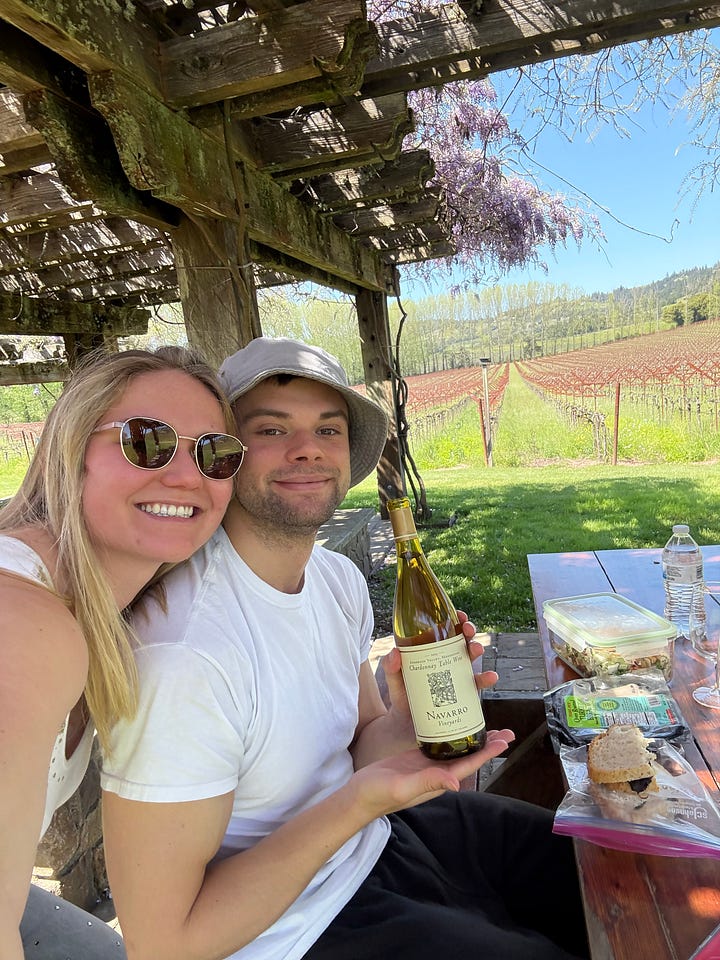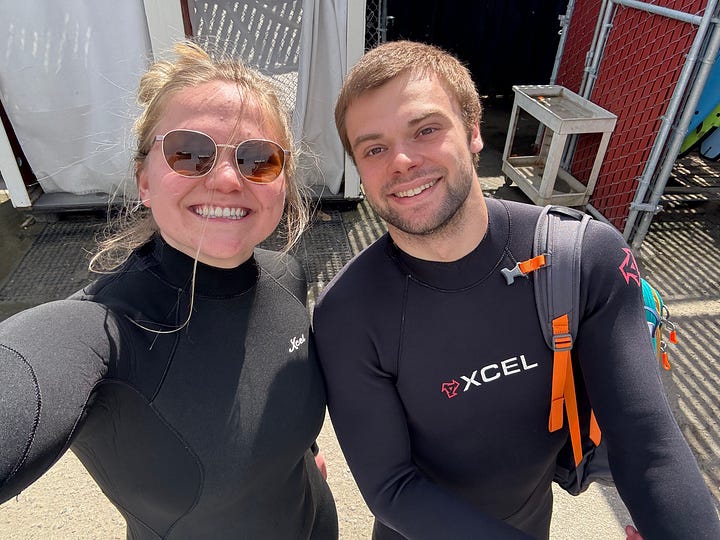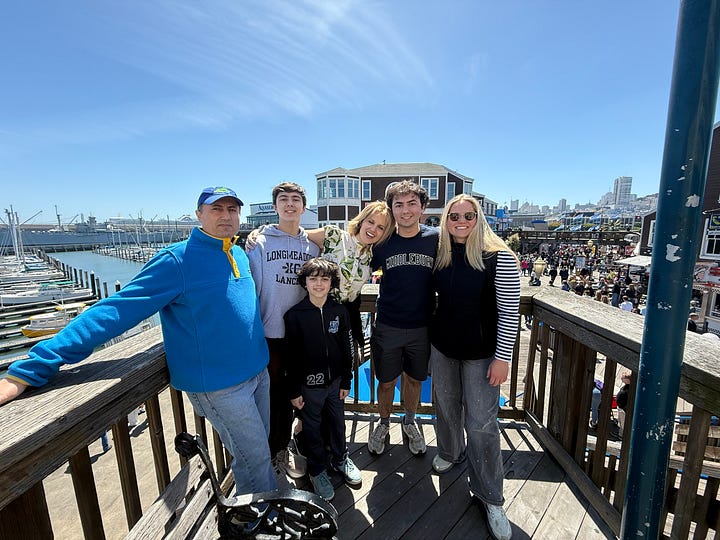🌘 The Dark Side of Self-Reflection (And How to Find Your Way Back)
🌞 Welcome to Full Stop. Sharing my brain so you can dive deeper into yours.
🌞Hey Full Stop
Welcome to the last week of April 2025 (holy shit).
My mind’s been everywhere and back since my last memo.
Some life updates:
I’m moving across San Francisco — from the Presidio to this lovely neighborhood called Telegraph Hill (which, according to the nice man on Craigslist who sold me a dinner set, is home to the "seminal" novel Tales of the City).
It’s also been a week of vacation — Harrison visiting from Brown, adventures in Mendocino (think Napa's cooler cousin — highly recommend), a cabin in the woods (and the mosquitoes that accompanied it), getting absolutely pummeled by waves in Pacifica while attempting to surf, and a visit from my aunt’s family, all the way from Massachusetts.




A lot of long drives, deep conversations, and one big thing on my mind: the state of it.
Vacations give me space to reflect — which, for me, isn’t always a good thing.
Lately, if I’m not careful, my reflections spiral into self-doubt.
The introspection I usually prize turns into over analysis, egocentricism, and self-criticism that leads... nowhere.
I write a lot about the importance of looking within.
But it would be irresponsible of me not to say: introspection can hurt if done incorrectly.
There’s a difference between self-improvement and self-criticism disguised as improvement.
The two may look similar on the surface — but their roots, their intentions, are entirely different.
This blind spot lives in a lot of "self help" content.
Hell, it’s lived here at Full Stop, too.
It’s time to draw a line.
Introspection ≠ Self-criticism.
Humans have a built-in bias toward spotting the negative — and it makes sense when you think about it.
Back when survival was the name of the game, it was a lot safer to assume the pretty berries might poison you, or that the rustling in the bushes meant something was about to eat you.
Fast forward a few thousand years: the bushes are now your inbox, your group chat, your Slack notifications.
Your brain is still doing what it was trained to do — scanning for what might go wrong.
That’s why a random comment from your boss can feel like a personal attack even if it wasn’t.
That’s why one awkward moment on a date will replay in your head for three days straight, even though everything else went fine.
That’s why when someone forgets to text you back, your brain jumps to “they hate me” instead of “they're probably just busy.”
Evolution gave us negativity bias because it helped us survive — but if we don’t check it, it can hijack our mental health.
And that’s where gratitude — the kind I talk about so much — comes in.
Practicing gratitude (whether it's journaling or literally just saying something out loud) feels awkward at first because we’re literally reprogramming our brains.
We’re reminding ourselves to not just see the dangers and disasters, but to catch the good stuff too.
It’s not about pretending everything’s perfect — it’s about reminding yourself: hey, something went right today.
(Even if some days, the win is just "I answered that awkward email I was avoiding.")
This week, a conversation with my former coach reminded me of something important:
We live in constant tension between two voices — our inner critic and our inner guide.
Your inner critic? Maybe it once served you.
Maybe it helped you avoid conflict with your siblings, your parents, your boss.
But when it starts fighting your guide — the calm, steady, instinctual voice inside you — it’s time to show it the door.
For me, that critic has a name: NN (Neurotic Natalie, duh right?).
Naming it helps create distance and lets me recognize when its taken the wheel.
Your inner guide, though?
That’s your gut instinct.
It’s the voice that knows what you need, even when it's just a whisper.
It’s the part of you that’s gotten you through every hard day so far.
For years, I mistook harsh self-criticism for motivation.
I thought if I was just hard enough on myself, I’d grow.
But you know what grows better?
Love. Patience. Compassion.
True motivation sounds like a friend sitting next to you saying,
"You don’t have to have it all figured out today.
The fact that you’re aware — that’s the important part.
Now, let’s take the next small step."
Please — don’t confuse reflection with self-attack.
Don’t let your critic drown out your inner guide.
Lead with compassion.
Lead with courage.
Remember that you, right now, today, are already enough.
🎯A few of insights I’ve compiled over the past week — talking to former mentors, reading, and listening to some voices that always ground me, like Mel Robbins (this episode hit hard), Jay Shetty and Humble the Poet (a conversation that seriously stuck with me).
You can be happy but not satisfied — and that’s okay.
Anxiety is when intelligence grows faster than courage.
Resilience doesn’t feel good while it’s happening.
You teach people how to be with you (set those boundaries).
Purpose = passion in service of others.
May you be resilient and compassionate this week — starting with yourself.
I’m cheering you on.
🌞If this resonates, send it to someone you love.
Maybe they need a little (compassionate) kick in the ass too.
And PS: I’m not a mental health professional — just a person exploring my mind the same way you’re exploring yours. If you're struggling, please know you are not alone, and you are absolutely worthy of real help. I encourage you to speak to a professional who can support you. ❤️
Loving Full Stop? Consider Donating!
Hi friends, I’m Natalie—a recent Brown University neuroscience grad now living in San Francisco. Through 🌞Full Stop, I share my mind so that you, amazingly insightful reader, can take the risk of exploring yours. Thank you for reading and being part of this journey.




